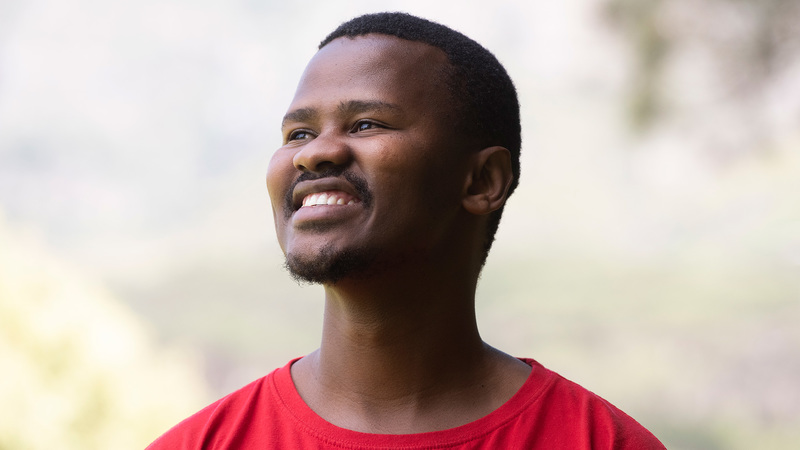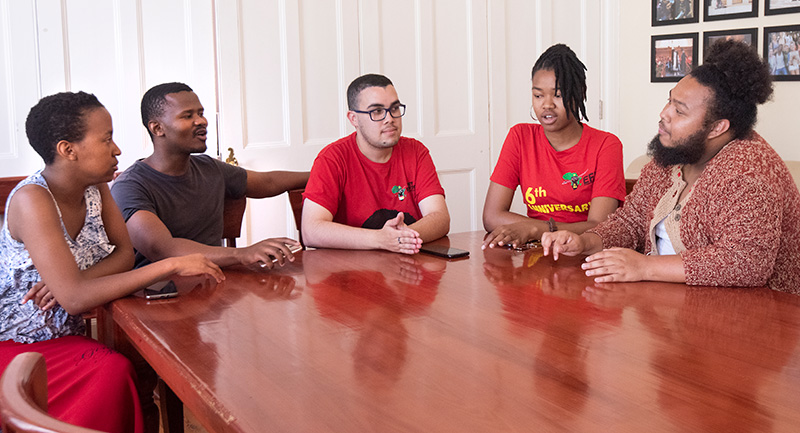Sustainability key for new SRC
28 November 2019 | Story Carla Bernardo. Read time 7 min.
The newly elected Student Representative Council (SRC), which represents all students at the University of Cape Town (UCT), is clear on their goals for 2019/2020: to create and implement programmes and initiatives that outlive their term of office.
“We want to start programmes or initiatives that will … outlive us beyond our term of office,” said SRC president Akha Tutu.
“And the only way you can do that is by identifying issues as they are and come up with solutions that will make people say, ‘We used to have this problem’.”
The SRC came into office on 1 November 2019 following their constituting meeting on 8 October. The committee is made up of 15 members with the majority party being the Economic Freedom Fighters Student Command (EFFSC), of which Tutu is a member.
“I always think, ‘why not politics?’, particularly as young people, because [it] affects every bit of our lives.”
Issues of utmost importance to the newly incumbent SRC include safety on campus, sexual and gender-based violence, which Tutu described as taking place on and off-campus and sometimes perpetrated by students, and the persistent problem of mental health.
“We want … programmes that are going to demonstrate our thinking outside of the box, not only for issues that concern university students … but people who are members of society,” said Tutu.
The final-year isiXhosa Language and Literature and Linguistics student said they are inspired by SRCs at other higher education institutions, particularly the EFFSC at the Cape Peninsula University of Technology. There, the Phephela Learners Initiative has resulted in impressive pass rates for students, said Tutu.
“The reason we are very much inspired by that [is that it] demonstrates people’s ability to think outside the box and … they want to solve issues that affect us not only as university students but as the youth of this country,” he said.
Collaboration and conversations
While the EFFSC is the majority party, making up 10 of the 15-member SRC, there are also four members from the South African Students’ Congress (SASCO) and one independent member. Collaborating across party lines is key for the 24-year-old student leader.
“We are not going to pretend we are not all students at the same university, and we want to address the same issues,” he said.
“We do not have a choice but to work well together.”
A meet and greet was held on Wednesday, 27 November, between the SRC and the university’s leadership team. Photos Michael Hammond.
Tutu said he wants to foster a relationship between the members founded on the understanding that they are in office for the students. As a collaborative, holding meaningful conversations with their constituencies that result in sustainable conversations is a must for the SRC.
One of these conversations is continuing decolonisation discussions that found momentum during the Rhodes Must Fall and Fees Must Fall era on campus and across the country.
“If you look at the renaming of certain buildings, that was a result of such conversations,” said Tutu.
“Those are not things that can be fixed just like that. If you have consistent, maintained conversations, people start to think, and people start to act and that’s when you see change.”
On a more personal note, he also wants to emphasise what he calls the “forgotten voices of the institution”, such as queer conversations which he believes has, of late, died down at the institutions.
“I am [queer] and therefore understand the struggles facing this institution as well as outside,” said Tutu.
“If we could start having those conversations in a very productive and influential way in this university, that is very powerful.”
Why student politics
Tutu and the rest of the SRC are all seasoned student leaders. Many have served on faculty committees and led in their respective residence committees.
For the SRC president, being an active participant in student politics is a continuation of South Africa’s history of political organisation and mobilisation.
“I always think, ‘why not politics?’, particularly as young people, because [it] affects every bit of our lives.”

Another SRC member, Declan Dyer, who serves as the corporate relations and fundraising coordinator, shared his reason for participating in student politics: “Since coming to UCT, I realised that there is a system designed to make power comfortable and as we know, mass protest action is unsustainable. So, to enact change, you need to be inside the system.”
Zinhle Geluk, the SRC’s international students coordinator, said she became involved in student politics because of her love for serving, her inclination for activism and wanting to drive change in whatever environment she finds herself.
Undergraduate academics coordinator, Lance-Selae August is looking to use his platform as a student leader to ensure faculty councils and student leadership work hand-in-hand to ensure a ground-up approach while secretary-general Asemahle Ntumntum became involved because of her own experiences as a UCT student.
As a first-year student at UCT, the 21-year-old Ntumntum struggled to find residence accommodation and approached the then-SRC for assistance. She was in turn recruited into student leadership where she, echoing her president, wants to see the implementation of sustainable programmes.
“There is a lot we want to do at UCT and not only change for a short period but change at a policy level, something that is going to exist for a long time at UCT,” said Ntumntum.
 This work is licensed under a Creative Commons Attribution-NoDerivatives 4.0 International License.
This work is licensed under a Creative Commons Attribution-NoDerivatives 4.0 International License.
Please view the republishing articles page for more information.
Listen to the news
The stories in this selection include an audio recording for your listening convenience.




























































































































































































































































































































































































